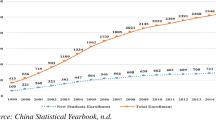Abstract
This paper uses cross-sectional data from the 1955, 1965, and 1975 Social Stratification and Mobility Surveys to investigate the effect of schooling on personal income in the Japanese male labor force. For each survey, log-income regressions are estimated which include (in addition to controls for years of work experience) two variables to indicate educational attainment: (1) years of schooling completed, and (2) percentile ranking in the distribution of years of schooling for one's age-cohort. The effect of the first educational variable may be interpreted as the human capital effect of schooling. The effect of the second educational variable may be interpreted as the screening or credentialing effect of schooling. The results indicate that controlling for the credentialing effect of schooling significantly reduces the net effect of schooling as human capital. Regression decomposition is then used to ascertain the components of the growth in mean log-income between 1955 and 1975. The contribution of years of schooling to the increase in mean log-income across these decades is significantly reduced after controlling for the credentialing effect.
Similar content being viewed by others
References
Aaron, H. J. (1978). Politics and the professors: The Great Society in perspective. Washington, DC: The Brookings Institution.
Abegglen, J. C. and Stalk, Jr., G. (1985). Kaisha: The Japanese corporation. New York: Basic Books.
Ando, B. (1979). An analysis of the degree-ocracy hypothesis, in K. Tominaga (ed.), The Structure of Stratification in Japan (in Japanese). Tokyo: Tokyo University Press.
Aoki, M. (1988). Information, incentives, and bargaining in the Japanese economy. New York: Cambridge University Press.
Becker, G. S. (1975). Human capital. Chicago: University of Chicago Press.
Blau, P. and Duncan, O. D. (1967). The American occupational structure. New York: John Wiley & Sons.
Bowles, S. and Gintis, H. (1976). Schooling in capitalist America. New York: Basic Books.
Chiswick, B. R. (1974). Income inequality: Regional analyses within a human capital framework. New York: National Bureau of Economic Research.
Dore, R. (1973). British factory, Japanese factory. Berkeley: University of California Press.
Featherman, D. L. and Hauser, R. M. (1978). Opportunity and change. New York: Academic Press.
Ganzeboom, H. B., Luijkx, R. and Treiman, D. J. (1989). Intergenerational class mobility in comparative perspective, Research in Social Stratification and Mobility 8: 3–84.
Griliches, Z. and Mason, W. M. (1972). Education, income, and ability, Journal of Political Economy S74-S103.
Hashimoto, M. and Raisian, J. (1985). Employment tenure and earnings profiles in Japan and the United States, American Economic Review 75: 721–735.
Jencks, C. et al. (1972). Inequality: A resasessment of the effect of family and schooling in America. New York: Harper & Row.
Jencks, C. et al. (1979). Who gets ahead? The determinants of economic success in America. New York: Basic Books.
Levin, H. M. (1977). A decade of policy developments in improving education and training for low-income populations, in R. H. Haveman (ed.), A decade of Federal Antipoverty Programs. New York: Academic Press.
Mincer, J. (1974). Schooling, Experience and earnings. New York: Columbia University Press.
Miyahara, K. (1988). Inter-college stratification: The case of male college graduates in Japan, Sociological Forum 3: 25–43.
Ojima, F. (1990). An analysis of the trend in educational opportunity, in J. Kikuchi (ed.), The structure of stratification in contemporary Japan, Vol. 3: Education and social mobility (in Japanese). Tokyo: Tokyo University Press.
Reischauer, E. O. (1978). The Japanese. Cambridge, MA: Harvard University Press.
Sørensen, A. B. (1977). The structure of inequality and the process of attainment, American Sociological Review 42: 965–78.
Sørensen, A. B. (1978). A model and a metric for the analysis of the intragenerational status attainment process, American Journal of Sociology 85: 361–84.
Spence, M. (1981). Signaling, screening, and information, in S. Rosen (ed.), Studies in labor markets. Chicago: The University of Chicago Press.
Takeuchi, H. (1985). Motivation and productivity, in L. C. Thurow (ed.), The managenment challenge: Japanese views. Cambridge, MA: MIT Press.
Thurow, L. C. (1975). Generating inequality. New York: Basic Books.
Willis, R. and Rosen, S. (1979). Education and self-selection, Journal of Political Economy 87: S7-S36.
Author information
Authors and Affiliations
Rights and permissions
About this article
Cite this article
Sakamoto, A., Chen, M.D. The effect of schooling on income in Japan. Popul Res Policy Rev 11, 217–232 (1992). https://doi.org/10.1007/BF00124938
Issue Date:
DOI: https://doi.org/10.1007/BF00124938




